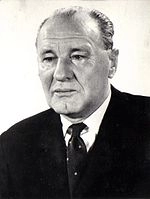How to Pronounce János Kádár
#50
Most Popular
Boost
May 26, 1912 Rijeka, Primorje Gorski Kotar County, Croatia Died on 06 Jul 1989 (aged 77)
Hungarian communist politician, prime minister
GeminiJános Kádár, Date of Birth, Place of Birth, Family, Facts, Age, Net Worth, Biography and More in FamedBorn.com

Hungarian communist politician, prime minister
Gemini